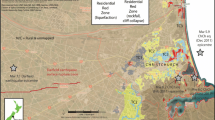Abstract
In frontier areas, where well data are sparse, many organizations have used expert judgment to estimate undiscovered resources. In this process, several important issues arise. How should the knowledge be elicited? At what level of aggregation (geologic process model, play, petroleum system, country, etc.) should the assessment be performed? How and at what stage of the assessment process should feedback be given to assessors? Is independent replication of estimates possible? How are issues of dependency treated? When and how should uncertainty be specified? The context for this presentation will be the methodology used in the US Geological Survey's 1998 1002-Arctic National Wildlife Refuge assessment of oil and gas resources.
Similar content being viewed by others
REFERENCES
Ames, D. P., and Neilson, B. T., 2001, A Bayesian decision network engine for internet-based stakeholder decision-making: Paper presented at the ASCE World Water and Environmental Resources Congress, Orlando, FL, May 20-24, 2001.
ANWRAssessment Team, 1999, The Oil and Gas Resource Potential of the 1002 Area, Arctic NationalWildlife Refuge, Alaska: U.S. Geol. Survey Open-File Rept. 98-34. (CD-ROM)
Attanasi, E. D., and Schuenemeyer, J. H., 1999, Economics and resource uncertainty: The 1002 Area of the Arctic National Wildlife Refuge, in Proc. 1999 SPE Hydrocarbon Economics and Evaluation Symposium, SPE 52948, Dallas, TX, p. 81-90.
Bird, K. J., 1999, Assessment overview, inThe Oil and Gas Resource Potential of the 1002 Area, Arctic National Wildlife Refuge, Alaska: U.S. Geol. Survey Open-File Rept. 98-34. (CDROM)
Cooke, R. M., 1991, Experts in uncertainty: Oxford Univ. Press, 334 p.
Cowell, R. G., Dawid, A. P., Lauritzen, S. L., and Spiegelhalter, D. J., 1999, Probabilistic networks and expert systems: Springer, New York, 333 p.
Dolton, G. L., Bird, K. J., and Crovelli, R. A., 1987, Assessment of in-place oil and gas resources, in Bird, K. J., and Magoon, L. B., eds., Petroleum Geology of the Northern Part of the Arctic National Wildlife Refuge, Northeastern Alaska: U.S. Geol. Survey Bull. 1778, p. 277-298.
Draper, D., 1995, Assessment and propagation of model uncertainty: Jour. Roy. Stat. Society, Ser. B, v. 57, p. 45-97.
Drew, L. J., and Schuenemeyer, J. H., 1993, The evolution and use of discovery process models at the U.S. Geological Survey: Am. Assoc. Petroleum Geologists Bull., v. 77, no. 3, p. 467-478.
Helton, J. C., 1994, Treatment of uncertainty in performance assessments for complex systems: Risk Analysis, v. 14, no. 4, p. 483-511.
Kaufman, G. M., 1993, Statistical issues in the assessment of undiscovered oil and gas resources: Energy Jour., v. 14, no. 1, p. 183-215.
Kaufman, G. M., 1996, Risk analysis: from prospect to exploration portfolio and back, in Doré, A.G., and Sinding-Larsen, R., eds., Quantification and Prediction of Petroleum Resources: NPF Spec. Publ. 6, p. 135-151.
Klett, T. R., Charpentier, R. R., and Schmoker, J. W., 2000, Assessment operational procedure, in U.S. Geol. Survey World Petroleum Assessment 2000-Description and Results, U.S. Geol. Survey Digital Data Series, DDS-60.
Mast, R. F., McMullin, R. H., Bird, K. J., and Brosge, W. P., 1980, Resource appraisal of undiscovered oil and gas resources in the William O. Douglas Arctic Wildlife Range: U.S. Geol. Survey Open-File Rept. 80-916, 62 p.
Merkhofer, M. W., 1987, Quantifying judgemental uncertainty: methodology, experiences, and insights: IEEE Trans. Syst.Man Cybern., v. 17, p. 741-752.
Meyer, M. A., and Booker, J. M., 2001, Eliciting and analyzing expert judgment: a practical guide: Soc. Industrial & Applied Mathematics, Washington, DC, 459 p.
Rose, P. R., 1987, Dealing with risk and uncertainty in exploration: How can we improve?: Am. Assoc. Petroleum Geologists Bull., v. 71, no. 1, p. 1-16.
Rose, P. R., 1992, Testimony to TexasWater Commission, June 30.
Schmoker, J. W., and Klett, T. R., 2000, U.S. Geological Survey assessment model for undiscovered conventional oil, gas, and NGL resources-The Seventh Approximation, in U.S. Geol. Survey World Petroleum Assessment 2000-Description and Results, U.S. Geol. Survey Digital Data Series, DDS-60.
Schuenemeyer, J. H., 1999, Methodology, in The Oil and Gas Resource Potential of the 1002 Area, Arctic National Wildlife Refuge, Alaska: U.S. Geol. Survey Open-File Rept. 98-34. (CD-ROM)
U.S. Department of Interior, 1987, Arctic NationalWildlife Refuge, Alaska, Coastal Plain Resource Assessment: Report and recommendation to the Congress of the United States and legislative environmental impact statement, 172 p.
Walls, L., and Quigley, J., 1998, Eliciting prior distributions from engineering experts to support Bayesian reliability growth modeling, Working Paper 98/14, in Management Science, Theory, Method & Practice: Univ. Strathclyde, Glasgow, Scotland, 18 p.
Author information
Authors and Affiliations
Rights and permissions
About this article
Cite this article
Schuenemeyer, J.H. A Framework for Expert Judgment to Assess Oil and Gas Resources. Natural Resources Research 11, 97–107 (2002). https://doi.org/10.1023/A:1015512002249
Issue Date:
DOI: https://doi.org/10.1023/A:1015512002249




